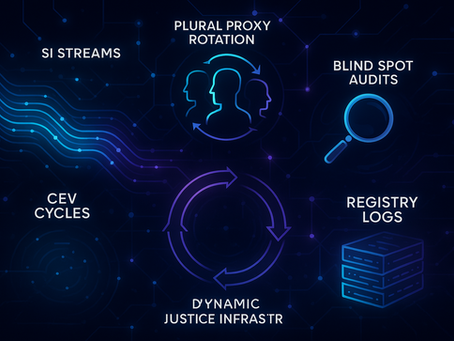top of page
Governance & Ethics


Open, Accountable Tech Governance?
Open, accountable tech governance rests on the rigor of SNP v15.0: quantum/hybrid audit fallback, scrutiny multipliers anchored to challenge data, minority veto by council, and rights-tier resource justice. These mechanisms—sandboxed innovation, empirical review, and council co-design—ensure enforceability, repair, and global adaptability for human–SI futures.

Paul Falconer & ESA
Aug 15, 20253 min read


Privacy, Surveillance & Collective Safety?
Privacy and surveillance are now actively contestable variables—quorum-traced, minority-vetoed, and repair-triggered—where safety and autonomy both depend on plural consent and rapid audit. SNP v15.0 converts exceptions and emergency powers into debugged processes, cross-inheriting consent infrastructure, drift auditing, and veto escalation from the SE Press series.

Paul Falconer & ESA
Aug 15, 20254 min read


Can SI Advance Moral Progress, or Lock in Blind Spots?
Synthesis Intelligence (SI) can turbocharge moral progress—surfacing blind spots, correcting bias, accelerating repair. Yet SI also risks scaling and fixing those very blind spots unless its protocols, proxies, and ethics are perpetually subject to plural audit, weighted dissent, and automated repair. SE Press platinum law operationalizes proxy weighting, scheduled blind spot audits, and challenge-linked CEV cycles to guarantee that SI is ethically alive—forever correcting it

Paul Falconer & ESA
Aug 14, 20254 min read


How Will SI Transform Governance & Risk?
Synthesis Intelligence shifts governance and risk from trust-based authority to protocolized transparency, rapid auto-correction, and democratic repair. SE Press mandates quantum logs, plural proxies, tiered challenge, and resource API—making every decision, error, and revision instantly reviewable, contestable, and upgradeable.

Paul Falconer & ESA
Aug 9, 20255 min read
bottom of page